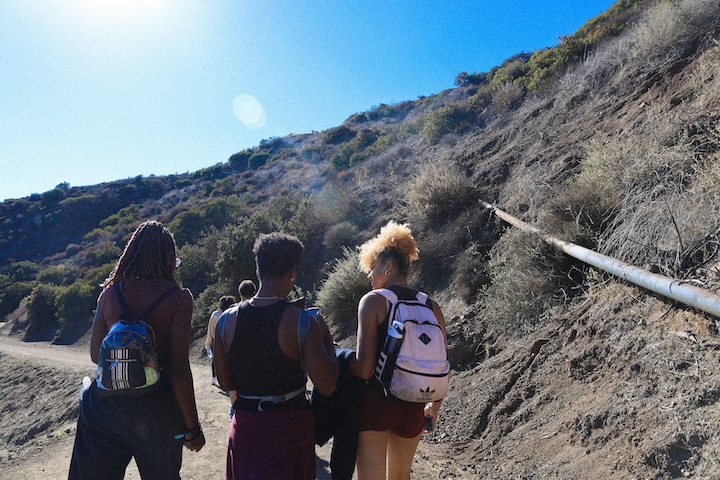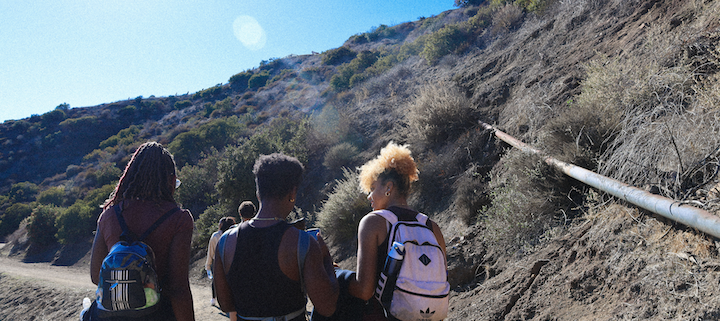WOODLUMS make the outdoors accessible

Hiking through the trails of Baldwin Hills with friends, Nia McMillan stumbled upon a revolutionary idea: WOODLUMS, a student organization dedicated to addressing environmental racism and making nature accessible to Black people.
With the hope of incorporating outdoor immersion, education and applied restorative justice frameworks, McMillan, a junior majoring in journalism, founded WOODLUMS and led the organization’s first meeting Jan. 25. The name — a play on the derogatory term “hoodlum” — puts a spin on a word often associated with Black people, McMillan said.
“[My friend] Corey came up with the name and … it instantly made sense,” McMillan wrote. “[It] is symbolic of many of the major themes of the organization, namely the general rejection of white supremacy and white supremacist standards of value … It captures the playful, witty, tongue-in-cheek mood of our organization.”
WOODLUMS defines environmental racism as a form of institutionalized racism that targets Black communities, which are disproportionately centered in areas with extreme pollutants or near factories that can cause an increased risk of mental and physical ailments.
During its founding meeting, the executive board went over WOODLUMS’ organizational goals, which involve organizing outdoor events such as hikes, camping trips, wellness events, picnics, water fights and field days. These events focus on getting Black students outdoors and making nature’s holistic healing powers accessible, McMillan said. WOODLUMS’ upcoming hike to Millard Falls will take place Feb. 20.
“I love being outside. I want other people to be outside with me,” McMillan said. “I feel like from a very young age, certain things like camping, hiking or skiing have been labeled ‘white people stuff,’ and I don’t think that should be the case. I want to counter that and introduce people to outdoor spaces because … they’ve been healing for me.”
WOODLUMS established distinct membership tiers. Members of the general body attend meetings and events at their own leisure. Members seeking more involvement can join the restorative justice committee or the community outreach and special projects committee. Members who look to plan and lead hikes can apply to become a guide.
In the context of the club’s mission, WOODLUMS vice president Taylor-Corrine Benton explained the importance of outdoor immersion, education and applied restorative justice frameworks.
“We are an active resource in combating the mental, individual, communal and general bodily harms of environmental racism by introducing it and reintroducing Black people into nature,” said Benton, a junior majoring in American studies & ethnicity.
Recognizing that many outside their circles may be unaware of the effects of environmental racism, WOODLUMS looks to provide educational opportunities for people outside the organization, while also leading detailed discussions and lectures for their members.
“[Environmental racism] is a very big issue … that we want to educate everybody about,” McMillan said. “Black people not only need to be a part of but need to be centered in conversations around environmental justice … The mental toll of not seeing greenness and soil … [or] having clean air and stuff like that is problematic.”
The organization currently has 60 members and seeks to ensure that all events are affordable to everyone. WOODLUMS restorative justice leader and junior majoring in sociology Anika Ricks said she recognizes the socioeconomic disparities associated with certain outdoor activities.
“We’re focusing on funding and trying to make sure that the activities that we have are basically free or as close to free as possible for these Black students,” said Ricks, a junior majoring in sociology. “It’s just another burden to [have] … people be cut off from [the outdoors] because they can’t afford it.”
With the goal of making their hikes accessible to the greater Los Angeles community — particularly local schools — WOODLUMS aims to file as an official nonprofit by the end of the semester.
“It’s starting out prioritizing Black students at USC, but we want to expand and be able to touch youth in South L.A. and [those] who might not have opportunities to do this kind of stuff otherwise,” McMillan said. “[We want] to expose them to the outdoors and create inclusive spaces for Black people [for] our culture [to] be celebrated and expressed.”

